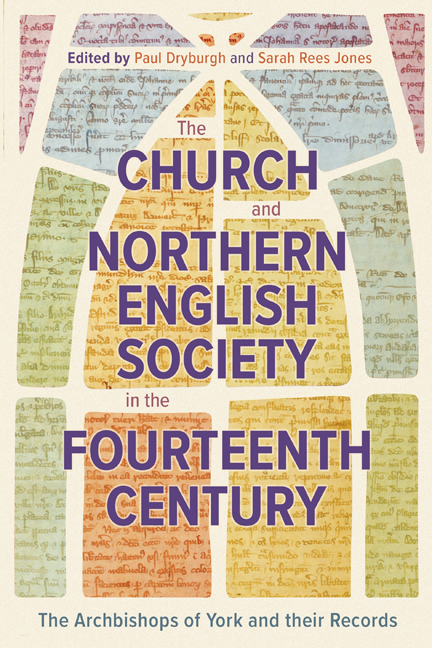 The Church and Northern English Society in the Fourteenth Century
The Church and Northern English Society in the Fourteenth Century Book contents
- Frontmatter
- Dedication
- Contents
- List of Illustrations
- List of Contributors
- Acknowledgements
- List of Abbreviations
- Map: The Ecclesiastical Province of York, c. 1304–1405
- Introduction
- 1 The Administrative Records of the Archbishops of York, 1304–1405
- 2 The Archbishops of York and the Government of Fourteenth-Century England
- 3 Support or Scourge? Archbishop William Melton and the Tradition of Loyal Opposition to the English
- 4 Beyond the Border: The Influence of York Clerks in the Two Edwards’ Scottish Administrations, 1332–1357
- 5 Responding to Royal Requirements: Clerical Taxation in the Province of York, 1304–1405
- 6 Ad insolenciam ipsius rebellis salubrius reprimendam: William Thorntoft, the Abbey of Rufford and Significations of Excommunication in the Northern Province
- 7 Blood, Sex and Holy Water: Reconciling Churches and Churchyards in the Medieval Diocese of York
- 8 Structuring Episcopal Authority: Palaces and Residences of the Archbishop of York
- 9 Medieval Parks of the Archbishops of York
- 10 Northern Ways? Pilgrimage, Politics and Piety in the Fourteenth-Century Administrative Records of the Archdiocese of York
- 11 Underexplored Sources for Gender History: New Approaches to the Fourteenth-Century York Archbishops’ Registers
- 12 Joan of Leeds and other Apostate Nuns in the Province of York, 1300–1350
- Bibliography of Records of the Archbishops of York, 1304–1405
- Index
12 - Joan of Leeds and other Apostate Nuns in the Province of York, 1300–1350
Published online by Cambridge University Press: 17 May 2024
- Frontmatter
- Dedication
- Contents
- List of Illustrations
- List of Contributors
- Acknowledgements
- List of Abbreviations
- Map: The Ecclesiastical Province of York, c. 1304–1405
- Introduction
- 1 The Administrative Records of the Archbishops of York, 1304–1405
- 2 The Archbishops of York and the Government of Fourteenth-Century England
- 3 Support or Scourge? Archbishop William Melton and the Tradition of Loyal Opposition to the English
- 4 Beyond the Border: The Influence of York Clerks in the Two Edwards’ Scottish Administrations, 1332–1357
- 5 Responding to Royal Requirements: Clerical Taxation in the Province of York, 1304–1405
- 6 Ad insolenciam ipsius rebellis salubrius reprimendam: William Thorntoft, the Abbey of Rufford and Significations of Excommunication in the Northern Province
- 7 Blood, Sex and Holy Water: Reconciling Churches and Churchyards in the Medieval Diocese of York
- 8 Structuring Episcopal Authority: Palaces and Residences of the Archbishop of York
- 9 Medieval Parks of the Archbishops of York
- 10 Northern Ways? Pilgrimage, Politics and Piety in the Fourteenth-Century Administrative Records of the Archdiocese of York
- 11 Underexplored Sources for Gender History: New Approaches to the Fourteenth-Century York Archbishops’ Registers
- 12 Joan of Leeds and other Apostate Nuns in the Province of York, 1300–1350
- Bibliography of Records of the Archbishops of York, 1304–1405
- Index
Summary
Few can have been the occasions when the fruits of labour in the archives of the medieval Church have graced the London stage. During the final month of 2019, however, sell-out audiences were treated to just such a spectacle in the form of a Christmas musical – ‘Joan of Leeds’. Written by Billy Barrett and Ellice Stevens and performed at the New Diorama Theatre by Breach Theatre, a young and innovative company, the play told the story of a nun – Joan – who escaped her convent, faked her own death and attempted to live a secular – sexually liberated – life in fourteenth-century, and later, twentieth-century, Yorkshire. Combining elements of the medieval mystery play, as performed by local amateurs, with a modern message, the writers of this hysterically funny piece also re-imagined Joan's character as one of devotion, but now with the message of a later discovery of self and sexuality. The production was based on a single entry, couched in forbidding, heavily abbreviated, rather florid ecclesiastical Latin, taken from the original register of William Melton, archbishop of York (1317–40), now held at the Borthwick Institute for Archives, University of York. Published in a full Latin transcript (with no translation) as recently as 2011 by Dr David Robinson in the sixth volume of the long-running edition of Melton's Register by the Canterbury and York Society, this entry, from 11 August 1318, records an order from Archbishop Melton to the dean of Beverley to issue a monition, or warning, to Joan of Leeds (Johanna de Ledis), a nun of the Benedictine priory of St Clement or Clementhorpe, York, to return to her house, and an order to pronounce a sentence of excommunication on her and to discover the names of her accomplices. The entry records that Joan had left her convent and travelled to Beverley, where she attempted to bring about her escape from the religious life.
Apostasy – in the monition, Joan is described as ‘apostatantem’ (‘apostatising’) – a breach of the vows of poverty, chastity and obedience that she had purportedly professed, involving casting off the habit of religion and wandering at large in secular society without authorisation and so risking excommunication, was not, as Donald Logan and Elizabeth Makowski have shown, an uncommon occurrence, and is a phenomenon regularly reflected in the records of the medieval English Church.
- Type
- Chapter
- Information
- The Church and Northern English Society in the Fourteenth CenturyThe Archbishops of York and their Records, pp. 285 - 308Publisher: Boydell & BrewerPrint publication year: 2024


